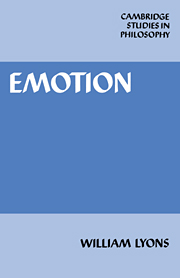Book contents
- Frontmatter
- Contents
- Preface
- Acknowledgements
- 1 Three classical theories of emotion: the feeling, behaviourist and psychoanalytic theories
- 2 A fourth classical theory: the cognitive theory
- 3 The causal–evaluative theory of emotions
- 4 The cognitive and evaluative aspects of emotion
- 5 The appetitive aspect of the emotions
- 6 The objects of emotions
- 7 Physiological changes and the emotions
- 8 Emotions and feelings
- 9 Emotions and behaviour
- 10 Emotion statements
- 11 Emotions and motives
- 12 Emotions and purpose
- 13 Blaming the emotions
- 14 Looking back: a summary
- Bibliography
- Index
14 - Looking back: a summary
Published online by Cambridge University Press: 03 December 2009
- Frontmatter
- Contents
- Preface
- Acknowledgements
- 1 Three classical theories of emotion: the feeling, behaviourist and psychoanalytic theories
- 2 A fourth classical theory: the cognitive theory
- 3 The causal–evaluative theory of emotions
- 4 The cognitive and evaluative aspects of emotion
- 5 The appetitive aspect of the emotions
- 6 The objects of emotions
- 7 Physiological changes and the emotions
- 8 Emotions and feelings
- 9 Emotions and behaviour
- 10 Emotion statements
- 11 Emotions and motives
- 12 Emotions and purpose
- 13 Blaming the emotions
- 14 Looking back: a summary
- Bibliography
- Index
Summary
This book has been an attempt to present a clear step-by-step account of one particular version of a cognitive theory of occurrent emotional states. I began, in the first two chapters, with a brief critical survey of classical theories of emotion and outlined four major theoretical streams, the feeling, the behaviourist, the psychoanalytic and the cognitive. Historically the movement has been from the Aristotelian-Thomistic cognitive accounts to the Cartesian or feeling theories, then, via William James, to behaviourism. Finally, via psychoanalytic and instinct theories, there has been something like a return to cognitivism in both philosophy and psychology. But this outline also brought to light that, both in philosophy, because of the influence of Wittgenstein and the Analytic school, and in psychology, because of the dominance of behaviourism and its conspicuous lack of success in the area of emotion, there has been a marked reluctance to put forward fullblooded theories of emotion. In this book, on the other hand, in keeping with the older tradition in both philosophy and psychology, I have put forward a theory in terms of a model of occurrent emotional states rather than an account of how we use various emotion terms.
I began the third chapter by clarifying what it means to give an account of emotional states rather than emotions considered dispositionally. Then I explained that I had called the theory I was espousing ‘a causal-evaluative theory’ because it claimed that the concept of emotion as occurrent state amounted to an evaluation which caused unusual physiological changes in the subject of the evaluation.
- Type
- Chapter
- Information
- Emotion , pp. 207 - 214Publisher: Cambridge University PressPrint publication year: 1980
- 1
- Cited by

